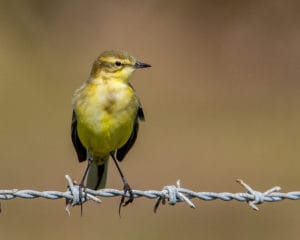Cornucopia’s Take: Bird populations have been in decline in the UK since the 1970s, due to loss of habitat and food plants and insects. Researchers tracked bird populations on 60 farms that left fallow fields for bird habitat and encouraged insects and plants for feed, finding increases in bird numbers. In order to make meaningful headway, the UK will need to assist farmers with subsidies. Organic farming practices promote habitat protection and species diversity, encouraging greater and more vibrant bird population numbers.
Wildflower planting on farms boosts birds, from skylarks to starlings
The Guardian
by Damian Carrington
 |
New research shows wildlife-friendly farming can quickly help bird populations bounce back, but large-scale rollout will be needed to reverse long-term declines
Planting wildflowers and protecting nests on farms enables birds, from skylarks to starlings, to bounce back rapidly from long-term declines, new research shows.
Intensive agriculture has led to overall farmland bird numbers in the UK plunging by more than 50% since 1970 and the fall has not stopped yet, with the latest figures showing a 9% drop from 2010 to 2015.
The new analysis shows that subsidy schemes that pay farmers to use about 10% of their land to support birds and other wildlife can work. But the RSPB experts behind the new study say such schemes will have to increase hugely in size just to prevent further falls in numbers.
Environment secretary Michael Gove said: “These results show that with the right management, and more targeted support for farmers, we can reverse the decline in numbers of our birds.”
Gove has said that after Brexit the “lion’s share” of farm subsidies in new UK regime will go to rewarding environmental benefits and not payments for simply owning land. The current scheme that supports environmental action has been sharply criticised over late payouts.
The new research, published in the journal Animal Conservation, assessed bird numbers between 2008 and 2014 at more than 60 farms in three regions: East Anglia, Oxfordshire and the West Midlands. Farms enrolled in the Higher Level Stewardship (HLS) scheme sowed seed-rich plants and wildflowers, which support insects, to provide food for birds, as well as leaving patches of fields fallow for birds such as corn buntings, and avoiding hedgerow cutting when birds were nesting.
Overall, the HLS farms increased farmland bird numbers by 50% in East Anglia and Oxfordshire and by 120% in the West Midlands. However, the success varied significantly between the 17 key species tracked.
Fivefold increases were seen in house sparrows and stock doves. But others, such as the turtle dove and yellow wagtail, showed no benefit at all, perhaps because of pressures they encounter on their long migrations to Africa and back.
Some birds showed only a temporary increase at the start of the study period, including yellowhammers and lapwings. This may be the result of a very wet summer in 2012 and freezing spring in 2013, both of which broke century old records and could have wiped out the early gains brought by the HLS schemes.
Will Peach, the RSPB’s head of research and one of the study team, said: “The UK has experienced a massive loss of farmland wildlife since the 1970s and this loss has continued during the last five years. But our latest study shows that when farmers are supported to adopt wildlife-friendly approaches, then bird life will rapidly bounce back.”
The researchers also used their data to calculate for the first time how much land would have to be covered by environment schemes to halt the loss of farmland birds. They found that current coverage was far below that needed, with a quarter required in the West Midlands sites compared to the actual coverage of 13%, while in East Anglia and Oxfordshire, coverage would have to be boosted from 20% to 33%.
“We have the knowledge and the tools to reverse farmland bird declines, what we need now is the political will to implement them more widely,” said Peach.
Gove said: “Leaving the EU gives us the opportunity to do more to protect our environment and wildlife, supporting farmers to manage the rich habitats and precious species under their stewardship in a more sustainable way. Our farmers are the original friends of the Earth and these results clearly demonstrate the vital role they play in protecting our wildlife and boosting biodiversity.”

